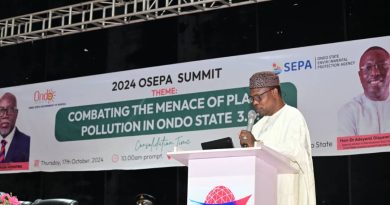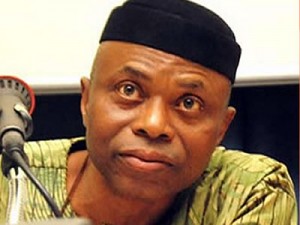Iroko: Of Imaginary Encirclement, Political Mischief And Underdevelopment Drive
By Comrade Adeola Tokunbo
THE Guardian’s special political report on Ondo State last Sunday did not pretend to be objective. One will, in this piece, therefore, not be approaching it from that angle.
Appropriately, the political report, which was supposed to be about Governor Olusegun Mimiko, did not contain as much as a reference to even one statement by the governor or any of his aides (in a lowdown crooked hatchet job, that would be a luxury); the two interviews conducted to back up the cover story were those of two Action Congress of Nigeria (ACN) gubernatorial aspirants, who, naturally, did not hide their morbid hatred for the governor.
Nor were the headlines pretentious either: ‘The encircled Iroko,’ ‘Mimiko’s government has failed, we shall remove it, says Ojo’ and ‘Our people will vote Mimiko out of power. Many aspirants mark ACN’s strength.’ The report deified Asiwaju Bola Tinubu and ridiculed, if you like reified, Mimiko.
The writer robed Dr. Mimiko in the garb of a villain, proclaiming, with unabashed candour: “Mimiko was a direct beneficiary, indeed, the first in the South-West epic political cum judicial battles… Unfortunately, while the Asiwaju was expecting a thank-you package in whatever form from Iroko, the latter got some strange inspiration to challenge his Ori to a wrestling match.”
Seriously, how did the South-West come to this sorry pass? What has happened to the Yoruba culture of deep and introspective intellectualism, social activism and robust appreciation of developmental politics?
To represent the Ghanaian novelist, Kwei Armah, in inverted terms, why are we so cursed? How come the great Awo is now being equated with Asiwaju Bola Ahmed Tinubu?
That is what Abraham Ogbodo, Deputy Political Editor of The Guardian, does in his piece which, one suspects should be irritating even to himself in his inner mind; if he still has a conscience, that is.
He confines the great Lateef Jakande to a Baba Kekere status, ascribes the Baba Oodua title to Tinubu and then accuses Governor Mimiko of trying to be another Baba of Oodua politics.
If the political editor is so naive as to assume that he could so easily hoodwink the South-West peoples — the primary target of his onslaught — or, on the other hand, if he actually believes in his daydream that the ACN will uproot Iroko from Ondo, that Bola Tinubu (obviously his new Awo) is “unchallenged” in South-West politics, together with the other inanities that he purveys with utter tactlessness, then one might be forced to recall the myth of Plato’s cave.
But then, all hope is not lost yet, and Black Africa’s most educated and most urbanised ethnic nationality will rise again, no matter the antics a thousand sycophants and bootlickers perpetually clutching at the coat tails of desperately corrupt, morally irredeemable and morbidly acquisitive individuals for filthy lucre, while masquerading, in Chinua Achebe’s terms, as “disinterested judges.”
At play here, then, is the Yoruba dictum of the intricate word (oro sunnukun), which must be examined from an equally intricate perspective (oju sunnukun la a f ii wo).
Let no one pretend that the ACN has any hopes of uprooting Iroko, the ise takun takun exponent from Government House, beyond the pages of newspapers. A political analyst worth his salt would have looked critically at the deciding factors in electoral victory rather than media frenzy, most importantly, structures.
Pray, what structures does the ACN boast of in Ondo State? Even his masses of confused aspirants are foreign-based pretenders, some of whom do not even know their own wards let alone have a winning structure.
And if the opposition had any hope of making an impressive outing previously, the quality and number of defections into the winning party, the Labour Party (LP), especially in the past few months, should have put paid to that dream. But, of course, it is not a crime to dream; in fact, dreaming is a fundamental human right guaranteed by the Constitution of the Federal Republic of Nigeria.
THE ACN, a no-hoper, will only take over Ondo State in the same way that it took over Benue, Kogi, Sokoto, Kwara, Akwa Ibom, etc., in recent times. These are areas where it deployed its greatest asset, media propaganda, to reap catastrophic results. Who but a naive reader of the political scenario would think that the Ondo case will be different?
The Ondo people — the people for whom the governor has continued to toil with tireless energy even in the face of continuous assaults from left and right by those who were born to bring down the good and elevate the bad, building state-of-the-art neighbourhood markets, mega schools without a parallel anywhere in Africa, agric villages bringing back the Awo/UPN days, and many more — are the ultimate judges of the Iroko’s fortune, not cheeky analysts who think that the Ondo people do not matter in determining who occupies Government House.
Interestingly, Barrister Sola Iji, one of the ACN aspirants interviewed for the special reports, dismissed the neighbourhood markets built by the present administration: “Unless, as a people, we want to remain at the level of peasantry, that is when we can talk of markets or town halls (sic)… But for a country that is developing (please mark the word developing), for a state that wants development fast, it must go beyond mere selling on peasantry form (sic). We must be a producing state; we must be an economically dynamic state.” But how? Hear the aspirant: “To move out of our current peasantry, we must bring agriculture away from what we are currently doing.”
So then, agriculture holds the key, right? Governor Mimiko has revolutionised the agric sector, building agric estates, renovating dams, with everything monitored by a quality assurance agency. And, by the way, Barrister Iji’s suggestion that a developing economy, or any economy for that matter, does not need state-of-the-art neighbourhood markets or town halls places him squarely in the camp of an alien from Mars.
Again, here is another Plato’s cave.
It is instructive that, for Ogbodo and his sponsors, “The real issues in the Ondo governorship election have taken a back seat. Nobody is asking, for instance, if Mimiko has done well enough to merit a second tenure. The refrain is, ‘Good or bad, the Iroko must fall.”
If, by this line, you think that the analyst aspires towards a modicum of objectivity, the sentence, which follows, clearly negates that thesis. Hear him: “And as the countdown continues, the burgeoning ACN crowd of supporters is increasingly transforming into a Roman mob, which does not ask question before it acts.”
If you think that this is an ordinary pronouncement, then consider that the Ondo State government, on Monday, alleged that the opposition was planning to sponsor violence attacks in the state, using hoodlums from neighbouring states. The government alleged that the opposition party had taken delivery of vests bearing Labour Party (LP) inscriptions to be used by their thugs. The government also spoke of “a campaign of violence in the state, using an Akure-based radio station and a national newspaper.”
However, on the same day, the government, which recently scored another first by building the first court in prison in Africa, revealed that it had increased its fleet of tractors from the initial 57 to 129, so that farmers could have enough equipment to work it.
But to the ACN and its media, performance does not matter. What matters is that, to quote Ogbodo again, “the Asiwaju has reportedly issued the order for the surrounding ACN states, including Edo, to work in concert to take over Ondo.”
What a democratic party, and what a great arrangement! How come the emperor did not issue an order for these governors to improve on their performance and make life meaningful for the people of their respective states? Or are we to believe that the people of the ACN-controlled states are so saturated with good governance that their governors now have the time to hatch a conspiracy to unseat another governor? Something tells critical analysts that political lepers will never lay hands on the resources of Ondo State, however hard they try.
So, why does Mr. Ogbodo want “a Roman mob, which does not ask questions before it acts” to take over Ondo State? What good would a mob, ruled by its muscles rather than its brain, do to any society?
In spite of himself, the writer destroys the very house he tried to build because the tragedy of every lie is that it contains the very germ of its own destruction, no matter its momentary fun.
Those who, in their underdevelopment drive, strive to uproot the country’s current most decorated governor have promised violence, their stock in trade. But the people are behind their governor. And that is sufficient.




